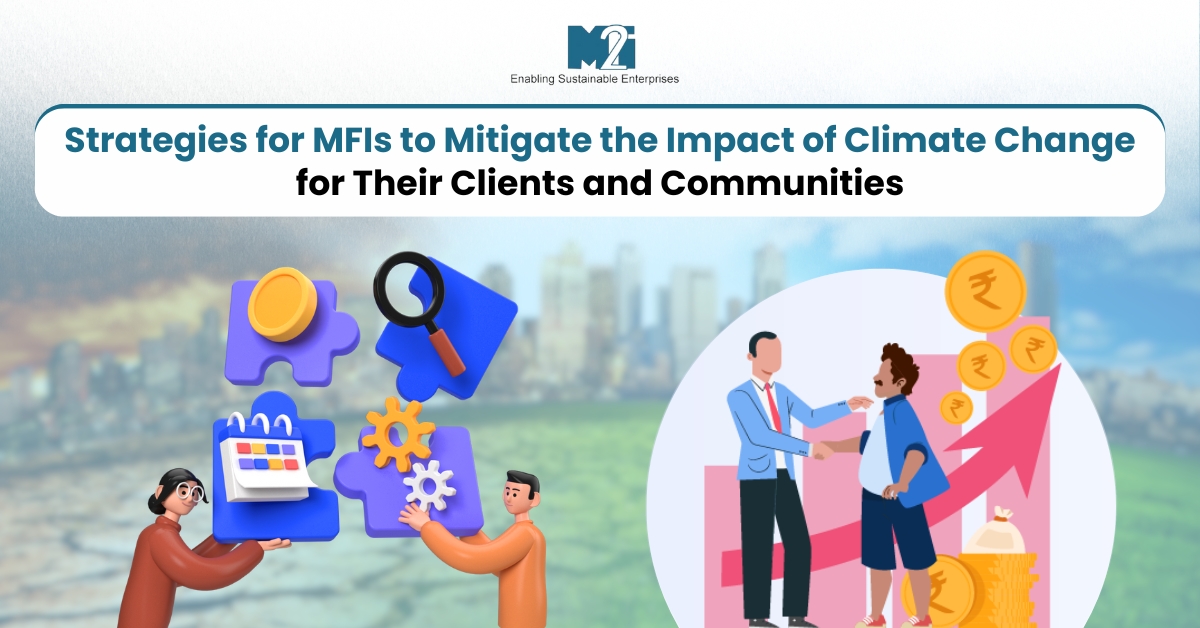
Strategies for MFIs to Mitigate the Impact of Climate Change for Their Clients and Communities
Climate change is an escalating global crisis that disproportionately affects the most vulnerable populations, particularly in developing countries. Microfinance Institutions (MFIs) have a crucial role to play in helping these communities build resilience and adapt to the changing environment. By implementing targeted strategies, MFIs can mitigate the impact of climate change and support their clients and communities in sustainable and meaningful ways.
1. Developing Climate-Responsive Financial Products
MFIs should innovate and offer financial products that are specifically designed to help clients adapt to climate change. This includes:
-
Climate Insurance Products: Insurance schemes that cover losses from climate-related events such as floods, droughts, and storms can provide a safety net for vulnerable populations.
-
Green Loans: Loans targeted at financing renewable energy sources, such as solar panels and biogas, or sustainable agricultural practices like drip irrigation and organic farming, can help reduce environmental impact and enhance resilience.
-
Emergency Loans: Quick-disbursing emergency loans can help clients recover from climate-related disasters more effectively.
2. Enhancing Financial Literacy and Climate Awareness
Educating clients about climate change and resilience strategies is essential. MFIs can:
-
Financial Education Programs: Integrate modules on climate risk management, sustainable practices, and the benefits of green financial products into financial literacy programs.
-
Community Workshops: Conduct workshops and training sessions on climate adaptation techniques, such as water conservation, sustainable agriculture, and renewable energy usage.
3. Leveraging Technology for Better Risk Management
Technology can play a pivotal role in helping MFIs and their clients manage climate risks. Strategies include:
-
Digital Platforms: Use mobile and online platforms to disseminate information about weather patterns, early warning systems, and best practices for climate resilience.
-
Data Analytics: Utilize big data and analytics to assess climate risks, understand client vulnerabilities, and tailor financial products to meet specific needs.
-
Remote Sensing and GIS: Employ remote sensing and Geographic Information System (GIS) technologies to monitor environmental changes and provide actionable insights to clients.
4. Building Strategic Partnerships
Collaboration with various stakeholders can enhance the effectiveness of MFI initiatives. Key partnerships include:
-
NGOs and Local Governments: Partner with organizations that have expertise in climate adaptation and disaster management to provide comprehensive support to communities.
-
Research Institutions: Collaborate with academic and research institutions to stay updated on the latest climate science and adaptation strategies.
-
Private Sector: Work with private companies to develop and promote innovative technologies and practices that enhance climate resilience.
5. Integrating Climate Risk Assessments
MFIs should incorporate climate risk assessments into their lending practices to ensure sustainability. This involves:
-
Environmental Impact Assessments: Evaluate the environmental impact of financed projects and promote those that contribute to sustainability.
-
Client Risk Profiles: Assess clients' vulnerability to climate change and tailor financial solutions to mitigate identified risks.
-
Monitoring and Evaluation: Continuously monitor and evaluate the effectiveness of climate resilience initiatives and make necessary adjustments.
6. Advocating for Policy Support
MFIs can play a significant role in advocating for policies that support climate resilience at the local, national, and international levels. This includes:
-
Policy Dialogue: Engage in policy dialogue with government bodies to promote the inclusion of microfinance in national climate adaptation and mitigation strategies.
-
Funding Mechanisms: Advocate for the creation of funding mechanisms that support green microfinance initiatives and ensure that funds reach the most vulnerable communities.
As the impacts of climate change intensify, MFIs have a critical role in supporting their clients and communities to build resilience and adapt to new challenges. By developing climate-responsive financial products, enhancing financial literacy, leveraging technology, building strategic partnerships, integrating climate risk assessments, and advocating for supportive policies, MFIs can mitigate the impact of climate change and contribute to a sustainable and resilient future. Now is the time for MFIs to take bold and innovative steps to ensure that the most vulnerable populations are not left behind in the fight against climate change.